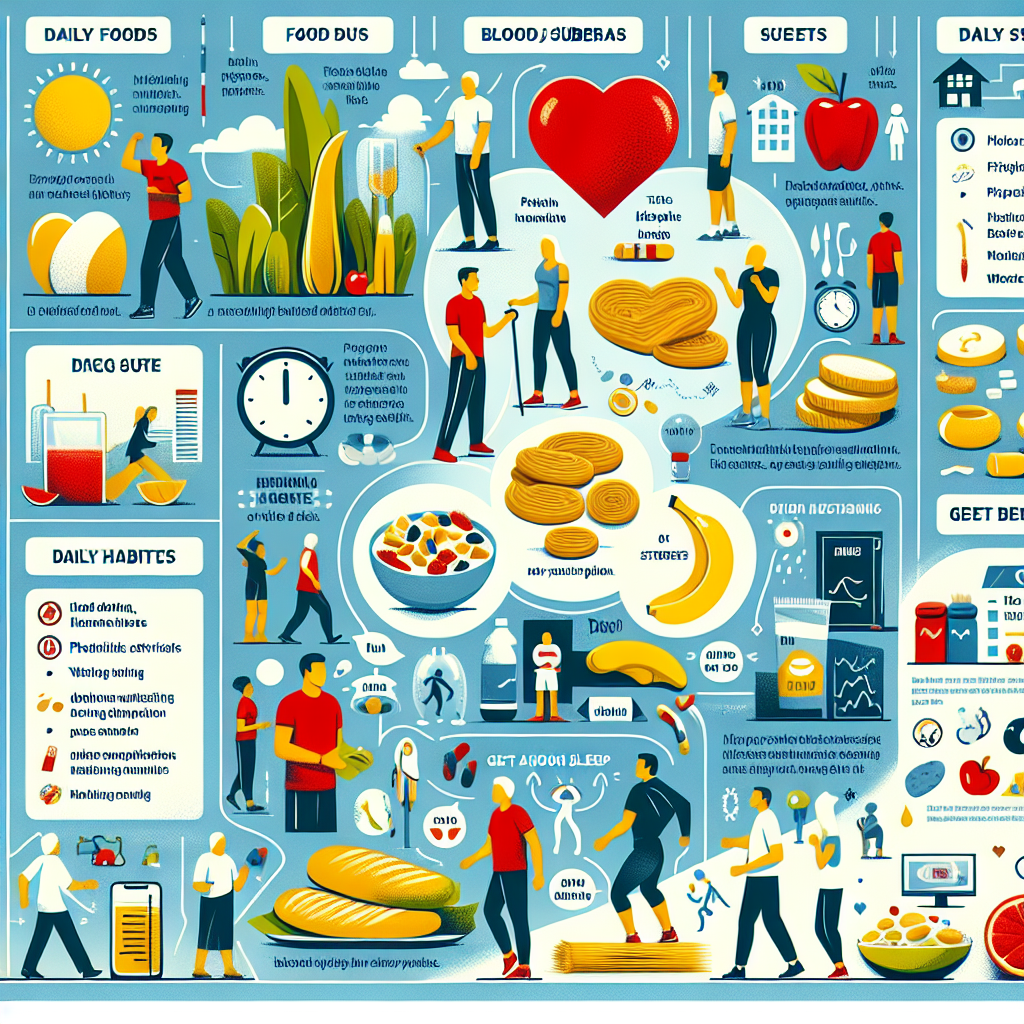Daily Habits and Foods That Help Regulate Blood Sugar

Discover the power of daily habits and foods that can help regulate your blood sugar. Learn more about these life-changing practices and start your journey towards a healthier lifestyle today. Click here to get started.
Daily Habits for Maintaining Healthy Blood Sugar Levels
Maintaining healthy blood sugar levels is crucial for overall health and well-being. It is especially important for individuals with diabetes or those at risk of developing the condition. Fortunately, there are several daily habits and foods that can help regulate blood sugar levels.
Firstly, regular physical activity is a key factor in blood sugar control. Exercise increases insulin sensitivity, which means your cells are better able to use available insulin to absorb sugar from the bloodstream. This can lead to lower blood sugar levels. A combination of both aerobic exercises, such as walking or cycling, and resistance training, like weight lifting, can be particularly effective.
In addition to regular exercise, maintaining a healthy weight is also important. Excess weight, particularly in the abdominal area, can increase insulin resistance, making it harder for your body to control blood sugar levels. Therefore, if you are overweight, losing even a small amount of weight can have a significant impact on blood sugar control.
Another crucial habit is getting enough sleep. Lack of sleep can affect the body’s insulin sensitivity and lead to increased blood sugar levels. Therefore, it is important to ensure you are getting at least seven to eight hours of sleep per night.
When it comes to diet, there are several foods that can help regulate blood sugar levels. Whole grains, such as brown rice, oatmeal, and whole grain bread, are high in fiber, which can slow the absorption of sugar into your bloodstream and prevent spikes in blood glucose. Similarly, fruits and vegetables, which are also high in fiber, can help keep blood sugar levels stable.
Protein is another important component of a blood sugar-friendly diet. It helps slow digestion, which can prevent blood sugar spikes after meals. Good sources of protein include lean meats, fish, eggs, and plant-based proteins like beans and lentils.
Healthy fats, such as those found in avocados, nuts, seeds, and olive oil, can also help regulate blood sugar levels. They slow the rate at which food leaves your stomach, which can prevent blood sugar spikes. However, it’s important to note that while these fats are beneficial, they are also high in calories and should be consumed in moderation.
In addition to these foods, certain spices have been shown to have blood sugar-lowering effects. For example, cinnamon has been found to reduce fasting blood sugar levels and improve insulin sensitivity.
Lastly, it’s important to stay hydrated. Drinking enough water can help your kidneys flush out excess sugar through urine. It can also help rehydrate your blood, lower your blood sugar levels, and reduce the risk of diabetes.
In conclusion, maintaining healthy blood sugar levels involves a combination of regular physical activity, maintaining a healthy weight, getting enough sleep, and eating a diet rich in whole grains, fruits, vegetables, protein, healthy fats, and certain spices. By incorporating these habits into your daily routine, you can help regulate your blood sugar levels and improve your overall health.
Top Foods to Include in Your Diet for Blood Sugar Regulation

Regulating blood sugar levels is a critical aspect of maintaining good health, particularly for individuals with diabetes or those at risk of developing the condition. Fortunately, there are several daily habits and foods that can help in this regard. This article will focus on the top foods to include in your diet for blood sugar regulation.
Firstly, whole grains are a must-have in your diet. They are rich in fiber, which slows down the absorption of sugar into your bloodstream and prevents spikes in blood glucose levels. Foods such as brown rice, oatmeal, quinoa, and whole grain bread or pasta are excellent choices.
Secondly, lean proteins are also beneficial for blood sugar regulation. They provide a feeling of fullness and help to stabilize blood sugar levels. Lean proteins include foods like chicken, turkey, fish, eggs, tofu, and low-fat dairy products.
Fruits and vegetables, particularly those with low glycemic indexes, are also essential. Berries, cherries, peaches, apricots, apples, oranges, pears, plums, and grapes are all excellent choices. These fruits are high in fiber and low in fat, which helps to regulate blood sugar levels. Vegetables such as broccoli, spinach, and bell peppers are also beneficial.
Legumes, including beans, lentils, and chickpeas, are another great addition to your diet. They are high in fiber and protein, which can help to control blood sugar. Moreover, they are low in glycemic index, meaning they have a minimal impact on blood sugar levels.
Healthy fats, such as those found in avocados, nuts, seeds, and olive oil, can also help regulate blood sugar levels. These fats slow down the absorption of sugars into the bloodstream, helping to prevent spikes in blood sugar levels.
In addition to these foods, certain spices and herbs have been found to have blood sugar-lowering properties. Cinnamon, for instance, has been shown in several studies to help lower blood sugar levels. Other herbs and spices, such as fenugreek, turmeric, and garlic, also have potential blood sugar-lowering effects.
While incorporating these foods into your diet, it’s also important to maintain a regular eating schedule. Eating at regular intervals can help prevent blood sugar spikes and crashes. Try to eat every three to five hours and avoid skipping meals.
Hydration is another key factor in blood sugar regulation. Drinking plenty of water helps your kidneys flush out excess sugar through urine. It also helps rehydrate your blood, lower your blood sugar levels, and reduce diabetes risk.
Regular physical activity is also crucial. Exercise increases insulin sensitivity and helps your muscles pick up sugars from the blood. This can lead to reduced blood sugar levels.
In conclusion, regulating blood sugar levels involves a combination of a balanced diet, regular eating schedule, adequate hydration, and physical activity. Including whole grains, lean proteins, fruits and vegetables, legumes, healthy fats, and certain spices in your diet can significantly help in this regard. Remember, it’s not just about the foods you eat, but also about maintaining a healthy lifestyle. Always consult with a healthcare professional before making any major changes to your diet or exercise routine.
The Impact of Everyday Routines on Blood Sugar Control
Blood sugar control is a critical aspect of maintaining good health, particularly for individuals with diabetes. However, it’s not just those with a diagnosed condition who need to be mindful of their blood sugar levels. Everyone can benefit from understanding how daily habits and food choices can impact blood sugar control.
One of the most effective ways to regulate blood sugar is through regular physical activity. Exercise increases insulin sensitivity, which means your body’s cells are better able to use available insulin to absorb sugar from the bloodstream. This can lead to lower blood sugar levels. Even light activities, such as walking or doing household chores, can have a positive impact.
In addition to physical activity, getting enough sleep is also crucial for blood sugar control. Lack of sleep can disrupt the balance of hormones in your body, including insulin. This can lead to higher blood sugar levels and increased insulin resistance. Therefore, it’s important to prioritize good sleep hygiene, aiming for seven to nine hours of sleep per night.
Stress management is another key component of blood sugar control. When you’re stressed, your body releases hormones that can raise your blood sugar levels. Techniques such as deep breathing, yoga, and meditation can help manage stress and, in turn, help regulate blood sugar.
Now, let’s turn our attention to the role of diet in blood sugar control. The foods you eat can have a significant impact on your blood sugar levels. Consuming a balanced diet rich in fiber, lean proteins, and healthy fats can help maintain steady blood sugar levels.
Fiber, particularly soluble fiber, slows the absorption of sugar into your bloodstream and prevents spikes in blood sugar. Foods high in fiber include fruits, vegetables, whole grains, and legumes.
Lean proteins, such as chicken, fish, and tofu, can also help regulate blood sugar. They slow down the absorption of glucose into the bloodstream, which can prevent blood sugar spikes.
Healthy fats, like those found in avocados, nuts, seeds, and olive oil, can also contribute to blood sugar control. They slow down digestion and the rate at which carbohydrates are broken down and absorbed, helping to prevent rapid rises in blood sugar.
However, it’s not just about what you eat, but also when and how much. Eating regular meals and snacks can help keep your blood sugar levels stable. Skipping meals or eating large amounts of food at once can cause blood sugar levels to fluctuate.
Drinking plenty of water can also aid in blood sugar control. Staying hydrated can help your kidneys flush out excess sugar through urine.
In conclusion, daily habits and food choices play a significant role in blood sugar control. Regular physical activity, adequate sleep, stress management, and a balanced diet can all contribute to maintaining healthy blood sugar levels. By incorporating these habits into your daily routine, you can take a proactive approach to your health and well-being.